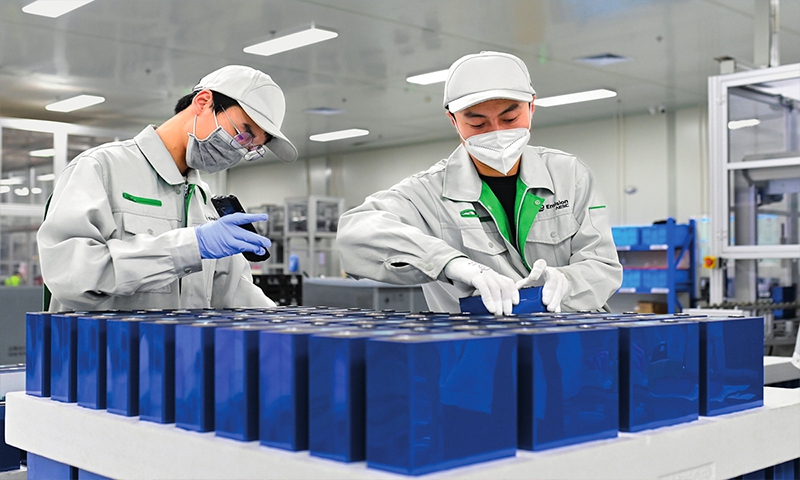
Staff members operate on a 10.5 GWh power battery production line at a local industry park in Ordos, North China's Inner Mongolia Autonomous Region on January 15, 2023. Photo:VCG
China intensified its tax incentive policies in 2023 to encourage companies to increase research and development (R&D) investment, which has bolstered confidence and determination among enterprises and injected greater impetus into corporate innovation and development, officials said on Thursday.
In March 2023, the country raised the pre-tax additional deduction ratio of R&D expenses for eligible companies from 75 to 100 percent, Huang Yun, director general of the General Office of the State Taxation Administration (STA), told a press conference on Thursday.
Furthermore, there was a heightened emphasis on promoting the high-quality development of the integrated circuit and machine tool industries. For enterprises meeting the specified criteria in these two sectors, the additional deduction ratio for R&D expenses was further increased to 120 percent, Huang said.
The tax authorities have diligently implemented tax and fee incentive policies, focusing on propelling the economic recovery and improvement, deputy head of the STA Rao Lixin said at the press conference.
China added over 2.2 trillion yuan ($306 billion) in nationwide tax reductions, fee cuts, tax rebates and fee deferrals in 2023, which effectively contributed to stabilizing market expectations, boosting market confidence and stimulating market vitality, Rao said.
These policies were implemented with greater precision, and the effects were gradually becoming apparent. Based on prepayments and declarations of corporate income tax in 2023, companies have cumulatively benefited from additional deductions of R&D totaling 1.85 trillion yuan, up 13.6 percent year-on-year.
Within this amount, manufacturing enterprises have enjoyed an additional deduction amounting to 1.1 trillion yuan, accounting for nearly 60 percent of the total, he noted.
Data showed that enterprises benefiting from the additional deduction policy for R&D expenses have an average profit margin of 7.4 percent, surpassing the average for all enterprises, Huang said.
The sustained increase in corporate innovation investment reflects the high-quality development of China's economy. Innovative industries are seeing an accelerated growth, with a year-on-year increase of 9.8 percent in sales revenue for high-tech industries in 2023, STA data showed.
In 2023, a report by the World Intellectual Property Organization revealed that China's ranking in the Global Innovation Index rose to 12th place. Furthermore, China topped the list of countries for the first time with the highest number of clusters among the top 100, having 24 in total.
According to data released from the Ministry of Industry and Information Technology, China has cumulatively nurtured 12,000 industry "Little Giants" with specialized expertise and innovation.
Total revenue from taxes and fees amounted to 31.7 trillion yuan for the year of 2023, Rao said.
During the key annual Central Economic Work Conference held in December 2023 in Beijing, Chinese leaders called for reasonably expanding the scope of special local government bonds as capital funds, implementing policies on structural tax and fee reductions, and mainly supporting scientific and technological innovation as well as the development of the manufacturing sector.
Global Times

